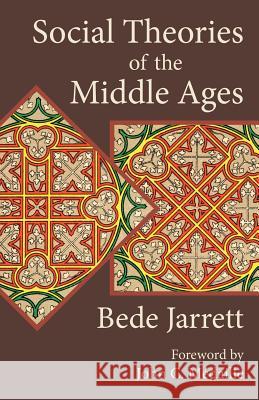Social Theories of the Middle Ages » książka
Social Theories of the Middle Ages
ISBN-13: 9781887593397 / Angielski / Miękka / 2012 / 296 str.
Social Theories of the Middle Ages
ISBN-13: 9781887593397 / Angielski / Miękka / 2012 / 296 str.
(netto: 77,89 VAT: 5%)
Najniższa cena z 30 dni: 76,84
ok. 16-18 dni roboczych.
Darmowa dostawa!
Can the medieval world still speak to the modern? The implicit answer in Bede Jarrett's remarkable work, Social Theories of the Middle Ages, is a resounding "yes." Fascinating as a purely historical study, it serves also to present the foundation whereby Christendom began to articulate the vision of a different kind of common life. Embedded in medieval doctrines regarding law, women, Christendom, art - and especially just war, property, money-making, and education - are principles that we would well relearn in the present age. By rediscovering the inner structure of such a society, we might forge our own adaptation of these principles in a new embodiment of distributist order. And in shaping such an alternative vision - one which can transcend the division and dehumanization of present political, economic, and social structures - there is no better starting-point than Social Theories of the Middle Ages.
Can the medieval world still speak to the modern? The implicit answer in Bede Jarretts remarkable work, Social Theories of the Middle Ages, is a resounding "yes". Fascinating as a purely historical study, it serves also to present the foundation whereby Christendom began to articulate the vision of a different kind of common life.Embedded in medieval doctrines regarding law, women, Christendom, art - and especially just war, property, money-making, and education - are principles that we would well relearn in the present age. By rediscovering the inner structure of such a society, we might forge our own adaptation of these principles in a new embodiment of distributist order. And in shaping such an alternative vision - one which can transcend the division and dehumanization of present political, economic, and social structures - there is no better starting-point than Social Theories of the Middle Ages.











